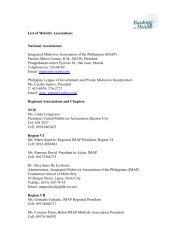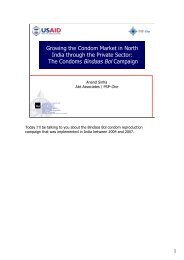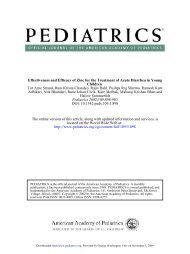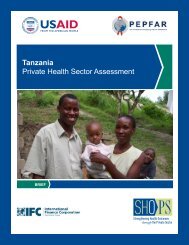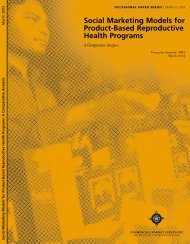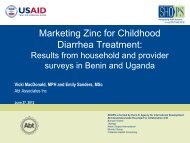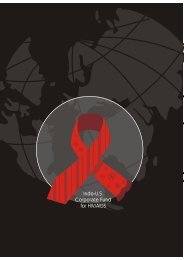Nigeria Private Sector Health Assessment - SHOPS project
Nigeria Private Sector Health Assessment - SHOPS project
Nigeria Private Sector Health Assessment - SHOPS project
Create successful ePaper yourself
Turn your PDF publications into a flip-book with our unique Google optimized e-Paper software.
clinical update training. Ministry of <strong>Health</strong> training programs are nominally open to the private sector,<br />
but there are no mechanisms for identifying and recruiting private providers to attend governmentor<br />
donor-supported training. Typically invites to private-sector providers are ad hoc and depend on<br />
personal connections. Of course, given the fluidity between the public and private sectors, publicsector<br />
investments in training often reach private-sector facilities. It is unclear what the criteria are for<br />
courses that qualify as continuing medical education, although the standards seem to be flexible. All<br />
councils think that training about management within the NHIS (such as capitation, covered benefits, and<br />
preventive skills) would be appropriate for continuing education credits.<br />
Under its own rules and procedures, each state health department licenses facilities. Before providers<br />
can establish a practice, the state must license their facility—even if it is licensed and registered at the<br />
national level. The licensing requirements vary from one state to another, as does the monitoring and<br />
enforcement of licenses.<br />
5.4 Service Quality Monitoring and Assurance<br />
The assessment team was not able to identify any significant assessments of the quality of care in the<br />
private sector, even with a limited focus on reproductive health. Government and donor resources have<br />
been focused on the public sector, and the main strategies addressing quality have involved increasing<br />
and strengthening supervision and training. Thus most of the evidence about quality in the private sector<br />
is partial and anecdotal. Paradoxically the private sector in <strong>Nigeria</strong> seems to provide both the best and<br />
worst quality of health care. In Lagos and other major cities, some of the private hospitals and clinics<br />
serving the upper-income groups offer the best care in the best facilities with the most well-trained<br />
staff in the country. The vast majority of private-sector care (and the vast majority of the out-of-pocket<br />
expenditures), however, are spent on providers at the other end of the spectrum—TBAs, community<br />
health workers, PMVs, traditional healers, and quack doctors.<br />
Given the high share of deliveries attended by TBAs (20.4 percent according to the 2003 DHS),<br />
government and policy makers cannot ignore these providers. Still there are concerns about the quality<br />
of TBAs’ services. According to COMPASS staff that works with some TBAs in Lagos, the focus of<br />
collaboration with TBAs is to improve their links to clinics, train them to recognize complications, and<br />
emphasize the need for referrals. A small study of TBAs in Atakumosa, <strong>Nigeria</strong>, identified a number<br />
of common concerns of TBAs: lack of a facility for deliveries, no recognition of at-risk pregnancies or<br />
complications, and lack of referrals. The TBAs the assessment team interviewed who had benefited<br />
from COMPASS training were able to cite the signs of at-risk pregnancies that should be the basis for<br />
referrals. During the discussions, however, they also said that in traditional practice, complications call<br />
for incantations or other more occult solutions. For traditional providers it is not customary to refer<br />
patients to more qualified providers. This information points to another factor in the use of unskilled<br />
providers in the private sector: an apparently large number of <strong>Nigeria</strong>ns do not perceive quack doctors<br />
or traditional healers as low-quality practitioners of Western medicine, but instead view them as quality<br />
providers of African medicine. This belief raises a broader issue about western “modern” medicine<br />
vs. African traditional medicine that would require more research to design effective demand-creation<br />
strategies.<br />
Data is available in the DHS on one indicator of quality: informed choice for contraception. On this basis<br />
private-sector providers seem to be offering lower quality services than the public sector.<br />
16



